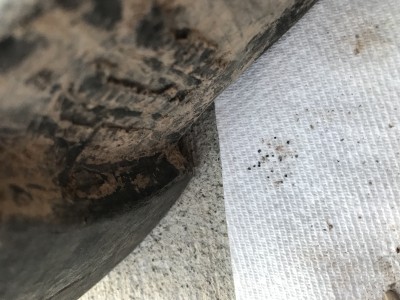The Muddy Boot Weed Seed Dispersal Method
Joshua Putman, Field Crops and Forage Specialist
Southwest New York Dairy, Livestock and Field Crops Program

Tall waterhemp is one of the most problematic weed species throughout the Midwest and has now arrived and spread to eight counties in Upstate New York. Waterhemp can spread from field-to-field and farm-to-farm on equipment, clothing, application equipment, or via water from over flooded ditches and rivers. Following a recent field day event we wanted to demonstrate the amount of weed seed that could travel back with you.
Boots that were considered "clean" were not as clean as we had thought (Figure 1). A knife was used to clean the boots and break up any hard clots that were present. Once the boots were clean, tweezers were used to separate the weed seeds from the dirt (Figure 2). We then separated out the pigweed/waterhemp seed from other weed seeds that were present and pigweed seeds were counted (Figure 3). We also double checked the dirt and found one pigweed seed stuck to a clay particle (Figure 4). Math was then conducted to estimate a 3 year establishment of waterhemp assuming 50% of the seeds were waterhemp and 100% were waterhemp, respectively.
The math is seen below:
16 pigweed seeds + 1 pigweed seed hiding in soil = 17 pigweed seeds from 2 boots.
Assuming only half of those are waterhemp and it can produce 250,000 seeds per female plant: 17/2 = 8.5 X 250,000 = 2.125 million seeds the following year in a field.
Assuming every seed on the bottom of the boots are waterhemp: 17 X 250,000 = 4.250 million seeds the following year.
Assuming 75% survival rate and reproduction in year 2: 4.250 million X 75% = 3.1875 million plants X 250,000 seeds per plant =
**796,875,000,000 seeds going into the soil in year 3 (potentially)
In conclusion, correct and early identification is very important; learn the correct features. Proper cleaning and sanitation of equipment, clothing, and vehicles can help prevent spreading. Intense management and continuous scouting are vital to eradication of this weed species. Mechanical control such as plowing can bury the seed deep which might decrease seed bank numbers.
Upcoming Events
Silvopasture on a Shoestring
October 7, 2025
Franklinville, NY
Join Joshua Greene, Director of Education at Trees For Graziers, Jonathan Bates, Statewide Agroforestry Educator, and Lynn Bliven, owner of Wild Geese Farm for a full day training event that will include classroom and hands-on sessions. The focus will be on DIY silvopasture projects on small grazing farms. We will address the practical considerations of tree establishment, protection, and maintenance while learning how silvopasture can help address your farm's resource concerns and enhance livestock grazing.
Optimizing the Economic Return of Pasture-Raised Slow-Growth and Conventional Broilers - Webinar
October 15, 2025
November 13, 2025
: Optimizing the Economic Return of Pasture-Raised Slow-Growth and Conventional Broilers - Webinar
Over the past three years, Cornell Cooperative Extension has worked with nearly 40 small farmers across NYS to gather information on the true costs of raising broilers (meat chickens) on pasture. This presentation is a summary of the findings of this research project.
Fecal Egg Count Mobile Workshop - East Aurora
October 21, 2025 : Fecal Egg Count Mobile Workshop - East Aurora
East Aurora, NY
This workshop will explain why regularly testing fecal egg counts can help you with understanding your animals' parasite loads and dewormer resistance. Attendees have the opportunity to prepare and evaluate fresh fecal samples under the microscope and practice interpretations.
Announcements
Herbicide Resistance Screening
We are screening weed species for herbicide resistance.Species we are looking for include, but aren't limited to:
- Tall Waterhemp
- Palmer Amaranth
- Marestail
- Redroot Pigweed
- Foxtails
- Common Lambsquarters
- Common Ragweed
Reach out to Katelyn Miller at 716-640-2047 or km753@cornell.edu for more information.





